
Buffalo Bulletin
Scope & Guideline
Empowering research, enhancing buffalo health.
Introduction
Aims and Scopes
- Veterinary Medicine and Animal Health:
Research on diseases, clinical management, and therapeutic advancements for buffaloes, including studies on mastitis, dystocia, and various surgical interventions. - Reproductive Biology and Genetics:
Studies focused on reproductive efficiency, genetic evaluations, and innovations in breeding practices aimed at improving buffalo productivity and health. - Nutritional Science and Feed Management:
Investigations into the dietary needs, feed efficiency, and supplementation strategies for enhancing milk production and overall health of buffaloes. - Morphological and Physiological Studies:
Research that includes anatomical studies, physiological responses, and developmental biology of buffaloes across various conditions and environments. - Market Analysis and Economic Aspects:
Assessment of buffalo production systems, market trends, and economic implications of buffalo farming, including meat and milk production.
Trending and Emerging
- Innovative Reproductive Technologies:
Increasing research on reproductive technologies such as artificial insemination, hormonal treatments, and cryopreservation techniques aimed at enhancing reproductive efficiency. - Health Management and Disease Control:
A growing emphasis on advanced diagnostic techniques and management strategies for diseases affecting buffaloes, including studies on mastitis, metabolic disorders, and zoonotic diseases. - Impact of Climate Change on Buffalo Production:
Emerging studies addressing how climate change affects buffalo health, productivity, and adaptation strategies in changing environments. - Sustainable Production Practices:
Research focusing on sustainable buffalo farming practices, including eco-friendly feed options and management strategies that reduce environmental impact. - Molecular and Genetic Research:
An increase in molecular biology studies, including genetic mapping and the use of genomic data to enhance breeding programs and disease resistance.
Declining or Waning
- Traditional Practices in Buffalo Farming:
Research related to ancient or traditional veterinary practices appears to be declining as modern veterinary science and technology gain prominence in buffalo management. - Historical Genetic Studies:
Studies focusing solely on historical genetic traits or lineage tracking are becoming less frequent as there is a move towards practical applications of genetic technology in breeding. - Basic Nutritional Studies:
While nutritional studies remain significant, there is a noticeable decline in basic research on conventional feed components, with a shift towards more innovative and complex dietary strategies.
Similar Journals
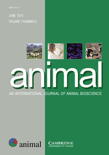
Animal
Fostering interdisciplinary dialogue in animal research.Animal is a leading academic journal published by Elsevier that stands at the forefront of research in the field of Animal Science and Zoology. Founded in 2007, it has rapidly garnered a prestigious reputation, achieving a remarkable Q1 ranking in its category for the year 2023, placing it in the top 4% of journals in the discipline. With an impressive impact, as indicated by its rank of 19 out of 490 in Agricultural and Biological Sciences on Scopus, this journal serves as a vital platform for researchers, professionals, and students to disseminate groundbreaking findings and interdisciplinary studies. Animal not only offers paid subscription access but also provides an option for Open Access, thereby enhancing the visibility and reach of significant research contributions. With its comprehensive scope and commitment to advancing the understanding of animal biology, behavior, and welfare, Animal plays a crucial role in shaping the future of animal science. For anyone invested in the environment, veterinary medicine, or wildlife management, this journal is an essential resource that fosters knowledge exchange and continued developments in the field.

Revista de Investigaciones Veterinarias del Peru
Advancing Veterinary Science for a Healthier TomorrowRevista de Investigaciones Veterinarias del Peru, published by UNIV NACIONAL MAYOR SAN MARCOS, stands as a pivotal resource within the field of veterinary sciences. With its ISSN 1682-3419 and E-ISSN 1609-9117, this journal aims to publish innovative research contributing to the advancement of veterinary practices and animal health. Since its inception in 1999, it has fostered an academic platform for professionals and researchers alike to share findings that are crucial for understanding and improving animal welfare in Peru and beyond. Although currently positioned in the Q3 category of Veterinary (miscellaneous) and ranked #163 out of 194 in the Scopus database, the journal's commitment to quality research and open access to veterinary knowledge continues to attract submissions and readership from a diverse audience. As it moves forward into 2024, the Revista de Investigaciones Veterinarias del Peru remains dedicated to disseminating critical insights that promote evidence-based practices in the veterinary field, stimulating further research and collaboration across continents.
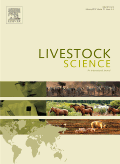
Livestock Science
Fostering Collaboration in Animal Science and Veterinary ExcellenceLivestock Science is a prestigious academic journal published by ELSEVIER, dedicated to the comprehensive study of animal science and veterinary medicine. With an esteemed Q1 ranking in both the fields of Animal Science and Zoology, as well as Veterinary (miscellaneous) in 2023, this journal is recognized for its impactful contributions to the understanding of livestock health, production, and management. The journal has consistently earned its high position within Scopus, ranking 26th out of 194 in General Veterinary and 86th out of 490 in Animal Science and Zoology, reflecting its significant influence within the research community. The open access policy allows for broader dissemination of knowledge, promoting collaboration among researchers, professionals, and students alike. With its continuous publication cycle from 2006 to 2024, Livestock Science remains an essential resource for anyone interested in the advancements, challenges, and innovations within the field of livestock management and veterinary practices.
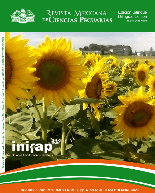
Revista Mexicana de Ciencias Pecuarias
Fostering Collaboration in Veterinary Medicine and ResearchRevista Mexicana de Ciencias Pecuarias, published by INIFAP-CENID PARASITOLOGIA VETERINARIA, is a prominent open-access journal since 2010 that caters to the fields of Animal Science and Veterinary Medicine. Based in Mexico, this journal addresses critical issues in animal health, production, and welfare, making it instrumental for researchers, professionals, and students seeking to advance their knowledge and practices. With an impact factor that reflects its growing influence, particularly in the Q3 quartile rankings in both Animal Science and Zoology as well as Veterinary (Miscellaneous) categories, the journal provides a vital platform for the dissemination of innovative research and findings. Additionally, its Scopus Ranks position highlights its role in publishing significant contributions to the fields of Veterinary Science and Agricultural Biology. The journal fosters a collaborative learning environment through its open-access model, ensuring that valuable insights are accessible to a wide audience. For those committed to enhancing animal well-being and advancing veterinary practices, the Revista Mexicana de Ciencias Pecuarias stands as a key resource through its rigorous peer-reviewed publication process and commitment to scientific excellence.
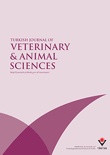
TURKISH JOURNAL OF VETERINARY & ANIMAL SCIENCES
Advancing Veterinary Science for a Healthier Tomorrow.TURKISH JOURNAL OF VETERINARY & ANIMAL SCIENCES is a distinguished peer-reviewed journal dedicated to advancing knowledge in the field of veterinary sciences and animal health. Published by the Tubitak Scientific & Technological Research Council Turkey, this journal provides a platform for high-quality research, fostering scientific inquiry that spans various aspects of veterinary medicine, animal biology, and animal husbandry. With an impact factor that reflects its growing influence within the Q3 category of Veterinary (miscellaneous) according to the 2023 rankings, it is strategically positioned in the academic landscape, ranked #112 out of 194 in the broader veterinary field. The journal is committed to open access publications, ensuring that research is accessible to a global audience, facilitating collaboration and knowledge sharing among researchers, professionals, and students. By covering a broad spectrum of topics from clinical research to veterinary policy, the TURKISH JOURNAL OF VETERINARY & ANIMAL SCIENCES plays a crucial role in enhancing the understanding and welfare of animal species, thereby contributing significantly to both scientific advancement and practical applications in veterinary practice.

Revista MVZ Cordoba
Empowering researchers with accessible veterinary science insights.Revista MVZ Cordoba, an esteemed publication of UNIV CORDOBA, is a pivotal resource for researchers and practitioners in the fields of Animal Science, Zoology, and Veterinary Medicine. Established as an Open Access journal since 2000, it facilitates widespread accessibility of scholarly articles from Colombia, fostering global collaboration and knowledge dissemination. The journal has demonstrated its commitment to quality, holding Q4 quartile rankings in 2023 across various categories including Animal Science and Zoology, and Aquatic Science. Despite its current challenges in rankings, with percentiles in the lower brackets, it represents an important platform for the advancements in these disciplines, specifically catering to emerging research and insights. The journal's annual publication cycle from 2008 to 2024 ensures that it remains timely and relevant in covering contemporary issues within veterinary science and related areas. For researchers, professionals, and students, Revista MVZ Cordoba stands out as a valuable avenue for the exploration of veterinary sciences within a diverse academic landscape.

Applied Animal Science
Advancing Knowledge in Animal and Food SciencesApplied Animal Science, published by Elsevier Science Inc, is an esteemed journal that has quickly made its mark in the fields of Animal Science and Food Science since its inception in 2019. With an ISSN of 2590-2873 and an E-ISSN of 2590-2865, this journal has received commendable recognition, achieving a Q2 ranking in both categories as of 2023. Encompassing a broad scope that integrates cutting-edge research and practical applications, Applied Animal Science seeks to disseminate knowledge that advances the well-being of animal systems and food safety. Researchers and professionals in the agricultural and biological sciences benefit from its high-quality articles, which are ranked #152 out of 490 and #200 out of 389 in their respective fields according to Scopus rankings. While currently not open access, the journal remains accessible to a global audience of scholars eager to explore innovative findings and robust methodologies. As it continues to grow through 2024 and beyond, Applied Animal Science aims to be a pivotal platform for fostering knowledge exchange and inspiring future studies in its domain.
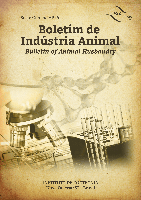
BOLETIM DE INDUSTRIA ANIMAL
Empowering Research for Sustainable Animal ProductionBOLETIM DE INDUSTRIA ANIMAL is a prominent academic journal dedicated to the field of animal industry, published by the Instituto de Zootecnia. As an Open Access journal since 1974, it provides a vital platform for researchers, professionals, and students to disseminate knowledge and advancements in animal production, husbandry, and veterinary sciences. With its commitment to enhancing the visibility and accessibility of research, BOLETIM DE INDUSTRIA ANIMAL encourages rigorous scientific inquiry and innovation within its community. The journal presents a rich repository of articles encompassing a wide range of topics related to animal science and industry practices. Published in Brazil and accessible globally, it aims to foster collaboration and knowledge exchange among scholars, ultimately contributing to the advancement of sustainable practices in the agricultural and animal husbandry sectors.
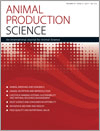
Animal Production Science
Advancing Sustainable Animal Production KnowledgeAnimal Production Science, published by CSIRO PUBLISHING, is a prestigious journal that caters to the fields of Animal Science and Food Science. With an ISSN of 1836-0939 and an E-ISSN of 1836-5787, the journal features high-quality research and reviews that are crucial for advancing the understanding and innovation of animal production systems. Recognized within the Q2 category of both Animal Science and Zoology, and Food Science, as per the 2023 Journal Rankings, Animal Production Science has achieved commendable Scopus rankings, placing it in the 68th and 48th percentiles in its respective categories. With converged years from 2009 to 2024, and an aim to disseminate knowledge that promotes sustainable practices, the journal is pivotal for researchers, professionals, and students devoted to animal production and food security. Exploring topics from livestock management to food quality, the journal offers valuable insights for enhancing productivity while considering welfare and environmental impact. For those seeking accessibility, the journal provides various open access options, encouraging a wider reach of its scholarly articles.

Indian Journal of Animal Research
Elevating Knowledge in Animal Research Since 2008Indian Journal of Animal Research is a prominent publication in the field of animal science and veterinary medicine, established to advance the understanding of animal husbandry, biology, and health. Published by the AGRICULTURAL RESEARCH COMMUNICATION CENTRE, this journal has been contributing to the scholarly discourse since 2008, with a commitment to high-quality research dissemination. With its current Q3 ranking in both Animal Science and Zoology and Veterinary (miscellaneous) categories, it serves as a crucial platform for researchers aiming to share insights and innovations within these disciplines. Although it operates without open access, it remains widely recognized, fostering a collaborative academic environment. The journal's impact is underscored by its presence within the Scopus database, providing valuable rankings in both General Veterinary and Animal Science and Zoology fields. Researchers, professionals, and students interested in veterinary advancements and animal research will find this journal a valuable resource for the latest scientific findings and discussions. Join the community of scholars igniting progress in the vital realm of animal research.